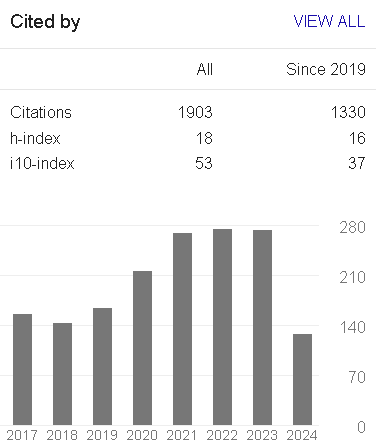Comparisons of classification algorithms on seeds dataset using machine learning algorithm
Keywords:
Classification, CART, KNN, LDA, LR, Machine Learning, NB, Predictive Analysis, Seed Classification, SVMAbstract
In history, agriculture has been the backbone of the economy. These agricultural activities remain undeveloped due to different factors. The current seed classification analysis is inefficient and has no validation mechanism. In this research, we have made an effort to present a predictive model to predict seed classes using machine learning algorithms. For this development, machine learning algorithm is used to learn from data which can be used to make predictions, to make real-world simulations. The developed model is experimented using seed dataset and then seed classes are predicted using the developed model. . The main machine learning methods used in this research is Logistic Regression (LR), Linear Discriminant Analysis (LDA), K Neighbors Classifier (KNN), Decision Tree Classifier (CART), Gaussian NB (NB), and Support Vector Machine (SVM). This is a good combination of simple linear (LR and LDA), nonlinear (KNN, CART, NB and SVM) algorithm. In this research we are trying to present distinctive machine learning approaches, for classification of various seeds which provide opportunity to individuals or agriculturist to identify various seeds.
References
F. Guevara-Hernandez and J. Gomez-Gil, “A machine vision system for classification of wheat and barley grain kernels”, Spanish Journal of Agricultural Research, vol. 9, no.3, pp. 672-680, 2011.
TekalignTujo G., Dileep Kumar G., ElifeneshYitagesu D., MeseretGirma B. "Predictive Model to Predict Seed Classes using Machine Learning", International Journal of Engineering Research & Technology (IJERT), vol. 6, no. 08, pp. 334-344, Aug. 2017.
A. R. Parnian, “Autonomous Wheat Seed Type Classifier System”, International Journal of Computer Applications , vol. 96 , no.12, pp. 14–17, 2014.
C. S. Silva and U. Sonnadara, “Classification of Rice Grains Using Neural Networks”, Proceedings of Technical Sessions, vol. 29, pp.
–14, 2013.
S. S. Dahikar and S. V Rode, “Agricultural Crop Yield Prediction Using Artificial Neural Network Approach”,International Journal of
Innovative Research in Electrical, Electronics, Instrumentation and Control Engineering, vol. 2, no. 1, pp. 683–686, 2014.
F. Guevara-Hernandez and J. Gomez-Gil, “A machine vision system for classification of wheat and barley grain kernels”, Spanish Journal of Agricultural and Research, vol. 3, no. 9, 2011.
Dreiseitl, Stephan and LucilaOhno-Machado, “Logistic regression and artificial neural network classification models: a methodology
review”, Journal of biomedical informatics, vol. 35, pp. 352-359, 2002.
Ye, Jieping, Ravi Janardan, and Qi Li. "Twodimensional linear discriminant analysis" Advances in neural information processing systems, pp. 1569-1576, 2005.
C.C. Chang and C.J. Lin, "LIBSVM: A library for support vector machines", ACM Transactions on Intelligent SystemsTechnology, vol. 2, pp. 1-27, 2011.
Punn, Meesha, and NidhiBhalla. "Classification of wheat grains using machine algorithms” International Journal of Science and Research, vol. 2, no. 8, pp. 363-366, 2013.
AltafSaeed, Muhammad Tariq, Muhammad Ibrahim, Nazir Ahmad Abu MazharAhmad,RaoSohailAftab, Syed Muntazir Mehdi, "Identification of Canola Seeds using Nearest Neighbor and K-Nearest Neighbor Algorithms", Computer Engineering and Intelligent Systems, Vol.6, no.10, pp. 36- 42, 2015.
Downloads
Published
How to Cite
Issue
Section
License
Copyright (c) 2018 COMPUSOFT: An International Journal of Advanced Computer Technology

This work is licensed under a Creative Commons Attribution 4.0 International License.
©2023. COMPUSOFT: AN INTERNATIONAL OF ADVANCED COMPUTER TECHNOLOGY by COMPUSOFT PUBLICATION is licensed under a Creative Commons Attribution 4.0 International License. Based on a work at COMPUSOFT: AN INTERNATIONAL OF ADVANCED COMPUTER TECHNOLOGY. Permissions beyond the scope of this license may be available at Creative Commons Attribution 4.0 International Public License.


